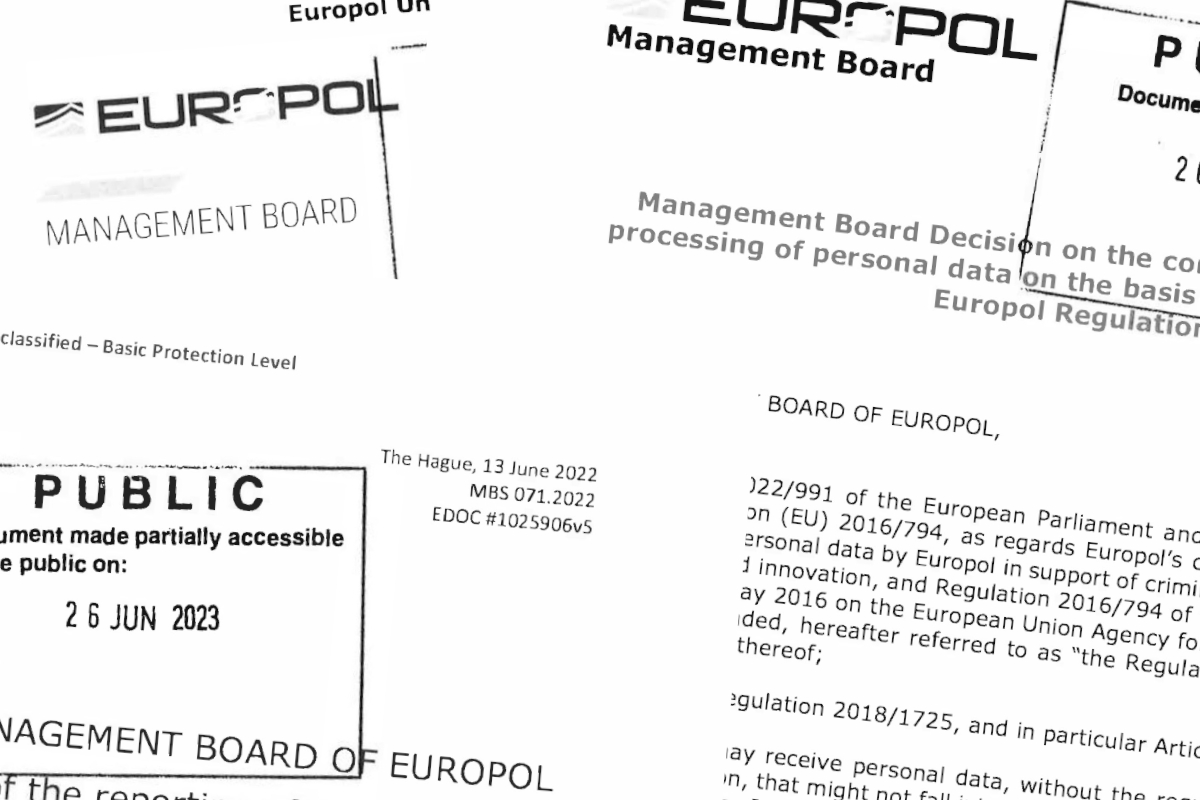Key Europol documents only made public following access request
Topic
Country/Region
18 July 2023
None of the decisions adopted by the policing agency's management board since the entry into force of the revamped Europol Regulation last summer were made public, in breach of Europol's own transparency commitments, until Statewatch filed an access to documents request.
Support our work: become a Friend of Statewatch from as little as £1/€1 per month.

In mid-May, Statewatch filed an access to documents request with Europol requesting copies of all decisions adopted by the agency's management board since 1 June 2022, the same month that legislation granting the agency extensive new powers came into force.
Six weeks later, Europol provided 12 decisions (available below), covering some crucial issues in light of the new powers wielded by the agency - four of the decisions lay down conditions regarding the processing of personal data on potentially vast numbers of people.
This includes personal data received from national and EU institutions and agencies, "private parties", and "retrieved by Europol from publicly available sources."
Those four decisions were adopted after a quarrel with the European Data Protection Supervisor, and previous versions of the decisions were excluded from release to Statewatch on the grounds that their publication "could undermine Europol’s the decision-making process by revealing details subject to internal deliberations at Europol".
Other decisions released deal with the rights and obligations of liaison officers; the designation of the Fundamental Rights Officer; and the secondment of national experts, amongst other things.
No further improvements
In December 2020, in response to a European Ombudsman inquiry that was launched following a complaint filed by Statewatch, Europol claimed (pdf) that its public register of documents "already contains some categories of documents on the core activities of Europol, i.e. legal framework, Executive Director's decisions and Management Board documents."
Since then, just one decision of the management board has been added to the agency's register, and just three decisions of the Executive Director.
Europol's December 2020 letter said that it aimed to make "further improvement" regarding the addition to its public register of documents released following access requests.
"In the past, due to technical difficulties, some of the documents were not immmediately uploaded on the register of documents. Europol aims to remedy this as soon as possible."
Whether the technical difficulties have been fixed is unknown - but whether they have been or not, the policing agency is not keeping commitments it made more than two years ago.
Documentation
Decisions of the Management Board of Europol (pdfs):
- repealing the Act of the Management Board of Europol of 29 November 2006 laying down the rules on Europol personal files (EDOC #1207117v7)
- on the early entry into force at Europol of Commission Decision C(2022) 1788 of 24 March 2022 on working time and hybrid working (EDOC#1226359v2)
- on the early entry into force at Europol of Commission Decision C(2022) 1715 of 24 March 2022 on home leave for officials, temporary staff and contract staff serving in a third country and repealing Commission Decision C(2013) 9035 final of 16 December 2013 (EDOC#1246375v3)
- on Law Enforcement Traineeships (EDOC #1215606v13)
- concerning the rights and obligations of liaison officers in relation to Europol (EDOC #1215443v10)
- designating the Fundamental Rights Officer (EDOC #1262828v5)
- further specifying procedures for the processing of information for the purposes listed in Article 18(2) of the Europol Regulation (EDOC #1252127v8A)
- on the conditions related to the processing of data on the basis of Article 18(6) of the Europol Regulation (EDOC #1252123v8A)
- on the conditions related to the processing of data on the basis of Article 18(6a) of the Europol Regulation (EDOC #1252125vlOA)
- on the conditions related to the processing of data on the basis of Article 18a of the Europol Regulation (EDOC #1252126v9A)
- laying down rules on the secondment of national experts to Europol (EDOC #1281940v4A)
- on the designating of the reporting officers of the Executive Director (EDOC #1025906v5)
Our work is only possible with your support.
Become a Friend of Statewatch from as little as £1/€1 per month.
Further reading

New police data exchange rules will expand Europol's databases
A new EU law on the exchange of data between national law enforcement authorities entered into force last month. It is intended to harmonise existing rules, speed up exchanges of information, and will lead to an increased amount of data being shared with Europol.

Europol management board in breach of new rules as soon as they came into force
The EU’s police agency, Europol, has landed itself in trouble again. Having been formally admonished by the European Data Protection Supervisor (EDPS) late last year for its illegal processing of vast quantities of personal data, and in September for refusing an access request to the personal data of a political activist and trying to cover it up by deleting his data from the system, Statewatch can now reveal that the agency’s management board was in breach of the new rules governing the agency as soon as they came into force in June.

New Europol rules massively expand police powers and reduce rights protections
The new rules governing Europol, which came into force at the end of June, massively expand the tasks and powers of the EU’s policing agency whilst reducing external scrutiny of its data processing operations and rights protections for individuals, says a report published today by Statewatch.
Spotted an error? If you've spotted a problem with this page, just click once to let us know.

